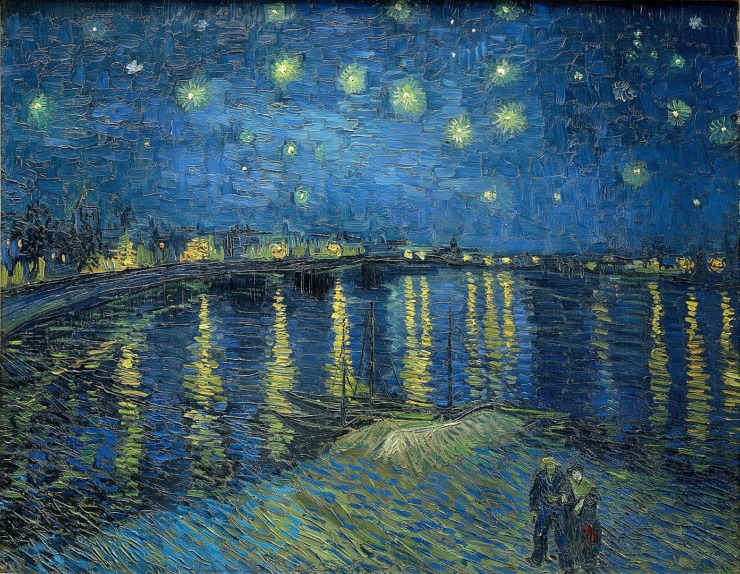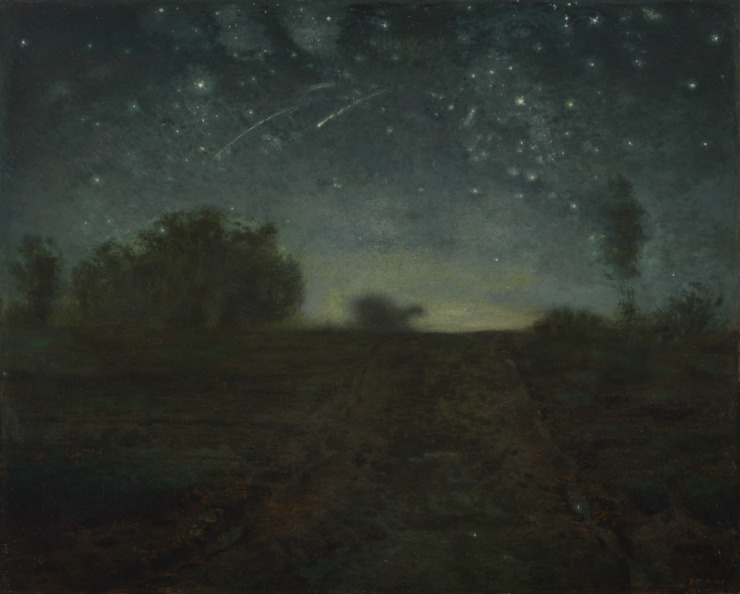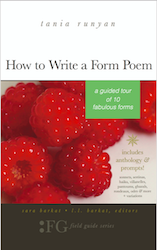< Return to Edgar Allan Poe Poems
Evening Star
‘Twas noontide of summer,
And midtime of night,
And stars, in their orbits,
Shone pale, through the light
Of the brighter, cold moon.
‘Mid planets her slaves,
Herself in the Heavens,
Her beam on the waves.
I gazed awhile
On her cold smile;
Too cold—too cold for me—
There passed, as a shroud,
A fleecy cloud,
And I turned away to thee,
Proud Evening Star,
In thy glory afar
And dearer thy beam shall be;
For joy to my heart
Is the proud part
Thou bearest in Heaven at night,
And more I admire
Thy distant fire,
Than that colder, lowly light.
—Edgar Allan Poe
Enjoy Artistic Representations of “Evening Star” by Edgar Allan Poe

Starry Night Over the Rhône by Vincent van Gogh, 1888.

Starry Night by Jean-François Millet, 1850-1865.
Listen to Readings of “Evening Star”
Listen to Musical Interpretations of “Evening Star” by Edgar Allan Poe
That’s it for readings of Evening Star by Edgar Allan Poe!
About Edgar Allan Poe
Edgar Allan Poe (1809-1849) published his first collection of poems, Tamarlane, and Other Poems, in 1827, when he was 18 years old. A tendency to run up debts (including for gambling) kept him in constant state of reinvention – college student, poet, short story writer, soldier/officer school, literary journal editor and critic.
The Poe who arises from Symons’ hand (his biographer in The Telltale Heart: The Life and Works of Edgar Allan Poe) is a man who first and foremost was determined to put Southern letters on the map, aiming to wrest control from the literary establishment in New York and New England (Poe aimed some rather pointed arrows at writers like Henry Wadsworth Longfellow). For his own writing, he wanted to be considered a poet. The poems were the important works; the stories were almost after-thoughts, almost dashed off primarily to raise funds. And he always needed money.
His personal life seemed to have stayed a general mess, but he had an enormous impact on both American and world literature. Consider the stories and poems that have been filmed, published, re-published, anthologized, celebrated and widely admired for more than 150 years: “Murders in the Rue Morgue,” “Fall of the House of Usher,” The Raven, “The Tell-Tale Heart,” Annabel Lee, “The Bells,” “Ulalame,” “To Helen.”
We associate Edgar Allan Poe with 19th century gothic. His stories are full of mystery, passion, horror, violence, death, and the supernatural. And yet his poems, especially “The Raven” and “Annabel Lee,” made him famous in pre-Civil War America and established his literary reputation.
Questions and mystery surrounded Poe’s own life and death, and continue even today – we may never know who left three roses and a bottle of cognac on his grave in Baltimore for decades until 2011 (alas, the “Poe Toaster” disappeared or died, to be seen nevermore).
You can read more about Poe’s biography in the articles Poets and Poems: Meeting Edgar Allan Poe and Forgotten Classics, The Telltale Heart by Julian Symons by Glynn Young, from which this biography was compiled.
I hope you enjoyed Evening Star by Edgar Allan Poe!
BUY ‘HOW TO WRITE A FORM POEM’ NOW!
